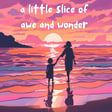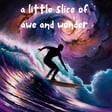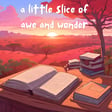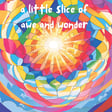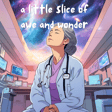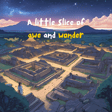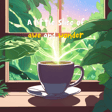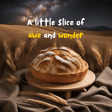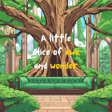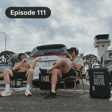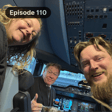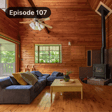Become a Creator today!Start creating today - Share your story with the world!
Start for free
00:00:00
00:00:01

Slice #2 - Finding Awe in Music
The host is joined by multi-instrumentalist, luthier, and all around amazing human, Tim McNalley, a musician with a deep connection to music and its transformative power. Tim shares insights into the metaphysical connection between musicians when playing together, reflecting on his journey from casual beginnings with instruments to moments of awe and wonder in his musical career. The conversation dives into how music can be a powerful tool for awe and wonder.
Show themes
Find Tim on IG @timmcnalley
Support the pod: https://buymeacoffee.com/goyama
Transcript
Introduction to Awe and Music
00:00:22
Speaker
What's up fellow humans, and welcome back to a little slice of awe and wonder, a cozy podcast about my two favorite emotions. In the first episode, I gave some definitions of awe and wonder, along with eight things that awe researchers have identified as being phenomena that reliably produce awe and wonder in humans. They're deemed the eight wonders of the world.
00:00:43
Speaker
And today, we're talking more specifically about one of these wonders, music. And as a musician, myself, this is my personal favorite. um To me, music is definitely awe-inspiring. It's a universal language. It connects us with other people, the sonic world, and even the transcendent mystery of life. um As the philosopher Nietzsche put it, in the birth of tragedy, without music, life would be a mistake.
Connecting Deeply with Music
00:01:11
Speaker
But these days, and I don't know if you feel it too, but it seems like music is dropping in value. um As it becomes free and ubiquitous, people are paying less attention to it. So my homework, my ask of this week to cultivate more awe and wonder is to spend some extra time listening through an album you love. um Try to do it without skipping tracks.
00:01:34
Speaker
and try to notice something that you've never noticed before. I recently got a vinyl player and so it's been cool to reconnect with music in a different way where I have to listen to the whole album all the way through. Try to reconnect with the miracle that sound is really just these movements of air pressure and they're so tiny. So just as a fun fact the change in air pressure of a plucked guitar string Raises the local atmospheric pressure from 14.7 psi to something like 14.700003 psi.
Introducing Guest Tim McNally
00:02:07
Speaker
So they're infinitesimal. And all of our sonic world. From a footstep on fresh snow to Coltrane's giant steps.
00:02:18
Speaker
comes from our brain processing these tiny, tiny air movements. It's really incredible. So today I spoke with multi-instrumentalist, Luthier, and just overall creative genius, Tim McNally.
Tim's Personal Story of Awe
00:02:33
Speaker
um I gave Tim a prompt before the conversation, which is, what is a personal story of awe when you encountered a vast mystery that transcends your understanding of the world? And that's something I took from the the book, Aw, by Dr. Keltner.
00:02:47
Speaker
I really want to know about how On Wonder drives people to do what they do and how it has shaped their lives so in different ways. So we talked through a huge range of topics. I'll link to some of the show notes, ah including how music can diminish the ego, ah rhythmic entrainment, frizzen, the depth of music and the transcendent. So I hope you enjoy and please welcome the awesome Tim McNally to the podcast.
The Power of Playing Music Together
00:03:23
Speaker
Tim McNally, how are you doing? I'm doing wonderfully. Thank you for having me. Well, you're one of my favorite humans, man. I'm so happy to have you on. Likewise. I'm i'm really glad that we're doing this. Just a little connective tissue. So Tim and I were musician friends at UCSD. We played a wide variety of interesting and also interesting gigs together yeah in the past. All interesting in their own right. Yeah. yeah the Glee Club, man. Yeah, we always live in my memory. Yeah, a lot to remember from that. um But what we're going to talk about today is probably related to um our musical experiences, specifically Tim's musical experience. And that connects to one of the the eight wonders of life, right? That's music. Yeah. And
00:04:13
Speaker
in our experiences together as musicians. I don't know if you feel the same way, but whenever I play music with somebody, I always feel closer to them after. And I'm not really sure why. There's this weird, when you connect with somebody, just weird feeling. Yeah. I mean, in the same way that if you have a conversation with someone, you feel closer to them.
00:04:32
Speaker
right Any chance that you have to like bridge that divide that we experience certainly in our culture where we feel very individual from one another. and Anytime you break through that and it's like, oh, hey, yeah, we're in the same space. Let's just have a conversation about you. All of a sudden you're like a little closer to them than you are anyone else in the room who you haven't spoken to. And I think that music, because it's a more specified interests, more specified skill, especially if you play the same kind of music or, you know, instruments that are compatible with each other. And you can communicate with someone through something completely different than language. I mean, that's very deep. You know, it's like dancing with someone or.
00:05:16
Speaker
Yeah, dude. Metaphysical, man. You're crossing that metaphysical gap. Definitely. It's beyond my ability to truly describe with words. Yeah, and that's maybe that's one of the reasons why music is distinct from conversations where you're saying because it is something you can't describe your words, right?
Music's Role in Social Connection
00:05:35
Speaker
Like when you're talking to somebody, you can never totally know whether or not they You know, because when we use language to take experience, make symbols out of it, and then we throw those symbols at the other person and then see if they get it, you know, we we can't transfer all that knowledge yeah to them. But I feel like music ah is this, it's almost like this other way of being connected to somebody. Totally. and And I mean, another way that it contrasts, I would say, you can have a musical relationship and a musical conversation with someone that is absolutely profound.
00:06:10
Speaker
and mutually feels very empowering and enlightening and you've really built something together and you can despise that person as an individual. yeah Or or i mean at least have an uncomfortable relationship with them or something like that but still on a musical level connect very deeply and that opens its own can of worms with you know separating art from artists and all that kind of thing. and I feel like I'm lucky to say that I don't really interact with a lot of people like that.
00:06:38
Speaker
But I know that it's a reality, you know. your Jam session with Kim Jong Un. Yeah, an incredible oboist. Maybe. A little in fact. Yeah, look it up. So there is there is science to support this. It is like magical, you know. Totally. But they've done a lot of research on specifically drumming.
00:07:00
Speaker
and in in kids. So there's this cool, one of my favorite studies, I feel like I mentioned this before, the bouncing yeah they bounce the babies at the same time as another researcher and then afterwards the the babies that had been bounced at the same time as the researcher, so they're like on beat versus off beat, were like way more likely to help the researcher.
00:07:21
Speaker
out and that is also true of so as you get older they've done a lot of work with drama circles in team groups that are going through mental health problems and they they find basically the same thing that groups are more likely to show pro-social behavior totally when they're when they've been drumming together and absolutely they call that rhythmic entrainment interesting entrainment yeah ah That's not a word I'm familiar with another example of that a friend of mine really by way of being a friend of my dad's he worked a lot with Homeless youth and he would bring instruments to them because ah a lot of it is them feeling basically powerless to change their so situation and giving them something that's not only something that they can
00:08:08
Speaker
occupy their time with, but also something that they can potentially busk, make a little money and and feel like they're like doing something productive, do something that's collaborative with other people in a similar situation. And he had enormous success with basically lifting people, not just their spirits, but their whole living situation.
00:08:26
Speaker
lifting them up
Evolution and Impact of Instruments
00:08:27
Speaker
through that too. So I feel like there's an enormous opportunity through music to connect with people because taking that example too, it's not just the people connecting within a small community, but connecting with everyone else around them. yeah A group of homeless kids playing a song together on the street was going to connect with everyone who's walking by on the street.
00:08:46
Speaker
yeah Whereas a lot of times you know in our our homelessness situation in this country, a lot of times we tend to try to ignore and pretend that they're not there. you know It's a very dismissive and you know a sad sort of dismissive relationship.
00:09:02
Speaker
Yeah, man. That's so powerful, dude. I love that. and You know, it makes me think of the fact that maybe one thing that it that music does is it's a reminder that we're all connected. yeah It's like a reminder of our connection to the entire system of the world. Totally. The entire universe, you know? Yeah. because music One thing that's cool about it is it's a process. you know And I think when we're in the world, we tend to see objects and things as separate from us. But in music, no note makes sense without the other notes. like You can't just play one note and have it without the context of any of the other ones be something musical. It requires relationships.
00:09:46
Speaker
Yeah, and i would I would say closer to that point of like things, objects feeling separate from us, it's like you can look at a piano or something like that. It's not like the piano came out of nowhere. It's like people were hitting things like pieces of wood, and then they realized that you could make different notes with different pieces of wood, and then they figured out how to make strings. And you know, like that whole development comes from not these instruments, which are incredibly complicated,
00:10:12
Speaker
hyper-specified tools, but it comes from people exploring their environment and taking something that's just sitting there and turning it into frequencies in the air that become meaningful. you know So it's it's like you know what was maybe just a piece of driftwood on the beach is suddenly an instrument that you're now communicating with people around you. And you can continue to do that today. you know There's no limit to what can or cannot be musical.
00:10:44
Speaker
Dude I heard this crazy fact the other day that so in in certain stroke patients like you can get one side of the brain that's essentially gets damaged and the other side's functioning and so they have certain cases where what typically happens is that if you have right hemisphere damage everything is more machine-like you start to see the world as sort of like a mechanism or like robotic and then in the opposite case in like left hemisphere damage when your right hemisphere is more functional there are certain situations where you start to see everything is more live you know things that wouldn't normally be considered alive you'd see them as alive and there are certain things like not everything but certain things that
00:11:26
Speaker
are more likely to be considered alive. And one of the big ones is musical instruments. Like they start to see them as living, like the violin that that is, it's actually part of the and extension of the human. Oh, absolutely. No, I think that's an enormous part of.
00:11:46
Speaker
instruments is that they become their own characters and you all you have to do is look at like historical violins like that have been around for hundreds of years that are enormously famous and enormously expensive because of it too but those instruments more often than not I would say have lives beyond the people that are playing them.
00:12:07
Speaker
They have histories and and value that are so important to us culturally. And that's why they've become so expensive, which is crazy to me. but But they have such incredible personality because of not just what they do as as tools. They're not just like functional objects, but they're also artifacts that connect us to a part of our history that most Most other artifacts like that you can't continue to make art with. Most things that are from the 1600s and 1700s are only preserved for our historical appreciation and are not like active in our creative communicative lives.
00:12:49
Speaker
you know yeah That's
Awe in Musical Traditions and Harmony
00:12:51
Speaker
a great point. And instruments are, I think, a pretty rare exception of that. you know I don't study a lot of other things, but you know I'm not familiar with like you know ancient tools that are being used today to create things. Yeah, like ancient screwdrivers. Yeah, exactly. yeah But I would be happy to be corrected.
00:13:10
Speaker
Yeah, for sure. The instruments, they're like turtles out here, you know, they got those long lifespans. Absolutely. They seem more than we have. Well, and yeah, people pass them down through the generations and they have stories to tell through that. yeah You know, at least we imbue them with stories, I think is probably more.
00:13:27
Speaker
Fair I don't know I can I could see it both ways. Yeah, I can see it both way there are times though when you know like when you look at an instrument that is like handsomely weathered that you can just like feel that it's like wow what an incredible energy coming from that thing that I Would say most of the time when you see something that's brand new even if it's a beautiful thing You don't have that that feeling of awe towards it where it's like, wow, this thing has lived so far beyond me and created so much music. And I think that we perceive that sort of positive energy from them, just from the visual experience of seeing its age too.
00:14:06
Speaker
yeah Yeah, you bring up a good point there, that awe and wonder, they've done studies where they have people that come in, like college kids that came in, they you know they saw an awe-inspiring scene, and they're more likely to see things as connected to a history after that, connected to a larger system. So you're like more likely to see the forest through the trees, you know? Totally. Like you could see how, yeah, you could see how this instrument has a rich past that it's connected to, like that has shaped where it is. And yeah, another point that I heard recently was that people's, this is more obvious point, but it's cool because I'd never think about it, but your own body physiology
00:14:47
Speaker
when you grow up around an instrument, like you grow up playing an instrument, it actually changes your physiology. Like, so like your arm positioning and you the way that your hands are set. totally Like you grow up, it's like a tree growing around an obstacle, you know, you also grow up and your body grows around the instrument that you play a lot. You're probably familiar with the jazz guitar player, Jim Hall, oh yeah like legendary jazz guitar player who passed away probably 10 or 15 years ago.
00:15:17
Speaker
Maybe not that long ago. Anyway, I got to see him very late in his life perform. And this is speaking of growing around the instrument. When he walked out on stage, he was really hunched over and really kind of like, you know, hobbling over and looked his age. He was probably, I think he was in his 90s at this time.
00:15:37
Speaker
and the moment that he sat down and picked up the guitar, he looked perfectly normal. wow like yeah His body was like really hunched over and like lopsided, and then as soon as you put the guitar in it, it just looked like someone playing guitar. Which was a very eye-opening thing for me at the time because you know I was young enough to realize in that moment that if I don't watch myself, now right that I really do need to take care of my body. so i think that there is It was an amazing thing to see, but also in a cautionary way where it was like, oh, I could really probably stand to hurt myself. you know or yeah There's a lot of imbalances that come with it too, but that was definitely eye-opening. It was an amazing performance too after that too, which was eye-opening in its own musical way.
00:16:27
Speaker
Yeah, awe-inspiring on several levels, right? Yeah, exactly. yeah On a very practical level and then on on a more sort of artistic level too. Cool. Speaking of which, like growing up around an instrument, what were your first moments that you can remember with instruments that so that stood out to you? Do you have any that were viewed with awe or wonder in any way? Because one thing I've been thinking about is the reason I connect with musicians especially too is because i feel similar in that there was this weird sense of awe and wonder that drove me to music in the first place and i don't know where that came from you know not everyone has the same reaction to sing instruments not everyone has the same reaction to hearing music although most humans feel some it does reliably produce awe in humans but i think there's like that second step one thing that i mentioned in the first episode is that awe and wonder are distinct and that awe is this like passive feeling that you get of like your
00:17:24
Speaker
mind opening up and then wonder is this like curiosity this yeah drive to figure something out and I think that wonder element is what separates a lot of musicians totally no, I Well, I'll i'll answer your question. My very first experiences like participating in music were very casual and I guess this is a byproduct of my upbringing because my dad is a professional musician and Our house is always littered with instruments, but as a young person, I was never specifically encouraged to play music. I was never pushed to take piano lessons or anything like that, that, you know, a lot of musical households, I think a lot of kids start very young and to the point where they don't even remember when they started, but it was all just out and around. And I remember in my dad's office, he had this, I think he still has it even, very cheap Yamaha keyboard, I believe.
00:18:18
Speaker
And it had presets for some songs and I remember specifically it had House of the Rising Sun and it would light up the keys as you would play it. It would light up the key so you could figure out how to play it. And I remember just like having.
00:18:33
Speaker
ah connection with this thing which otherwise it wasn't like I had seen some piano performance and I was like oh my god I need to do that but it was just like an object in the house that was engaging in sort of like a playful way and I remember investing time into it to learn how to play that little melody and it's funny because I didn't I a lot of people would expect growing up in ah in a musical household that you would have more of that oh you should do this you should do this and And I remember that experience specifically because it was more just, like you said, curiosity, just like engaging with this thing, just entertaining myself with this thing. And when I actually started playing music in a more focused way, it was similarly casual, I guess. I had a friend who was doing a band camp and he was playing guitar and he said, Hey, you should play bass so that we can be in a band together.
00:19:21
Speaker
It was like, really, it could have been lacrosse. You know, it could have been could been been gardening. You know, it really had nothing to do with the fact that it was music, but it was that I wanted to be spending time with my friend, which I guess gets back to that point of life.
Ego Dissolution and Musical Connection
00:19:33
Speaker
It's a communicative, it's a... it's a relationship Yeah, it's it's a process that exists in a context of doing with other people.
00:19:40
Speaker
There's obviously solo instrumentalist solo music, but it even that the whole point of it is that it reaches other people at some point or they communicate something Bigger than just ourselves or doing it for ourselves in my opinion um But I guess the point that I'm getting to is that I feel like the first exciting thing to me about playing music was like performing, you know and with that and i think this is why a lot of people get into music in the first place too it's a little different from awe and wonder but there's like a there's an ego boost that comes with it you know what and i mean there's something that's like very exciting about being on a stage and like you know as a young kid i think i was 12 when i first started really
00:20:24
Speaker
focus Lee playing music and it felt like oh Yeah, this is I have a purpose now and I can do this and people will want to see me do this thing you know Totally and and it felt really good But at its core it's good because it's feeding an ego thing I think and it took a while longer Before I had the experience that really I think cemented it in me that this is what is so deep and meaningful in my life which I think is the experience when you are playing music with someone and especially I think improvising with someone
00:21:05
Speaker
and you connect on this deeper level where you just feel ego of performance totally disappear. Like you're not even the one doing it anymore. And I've had experiences where I felt I was playing, like one in particular, I was playing at the Centrum Acoustic Blues Festival and Workshop, and I didn't really think of myself as much of a guitar player. how long he was there Well, this was when I was 25, I guess.
00:21:33
Speaker
this is later in life but you know this is just a specific example but you know i didn't think of my i've always played guitar but i mostly professionally played the bass played guitar in some bands you know most of my friends are amazing guitar players yourself included but i remember mostly like laying back for most of the jamming there because i was like there's amazing guitar players here but one time in particular i remember just being in the room with a bunch of people very casual not performing for anyone And just feeling so incredibly connected and taking a solo on something and while I was doing it being like, I don't know how to do this, you know what I mean? Like playing something that felt so beyond myself that it wasn't even me doing it. It was just like,
00:22:15
Speaker
the music that needed to happen and I was just like lucky to let it pass through me and that kind of experience for me is like the most meaningful thing it's I feel more connected to everything in the world at that moment because it's not about my performance how I'm making the people around me feel the audience it's just feels like it feels like there's this thing around us that like is musical ideas are just like all there. All these vibrations are happening, or they have the potential to happen anyway, and then you just become a channel through which they can flow.
Awe and Creativity in Music
00:22:53
Speaker
And and that kind of experience really, I skipped forward to you know age 25, but for me, I remember when I was maybe be like late middle school, early high school, when I first started like understanding enough about instruments to like really improvise with people,
00:23:09
Speaker
really in at the time were like jamming, you know, psych rock or something, something loud, like maybe something groovy, whatever. But then you're doing something that you've never done before, that no one's ever done before. It's a unique experience. Maybe stylistically it's like similar to other stuff, but like you're creating an experience that not only has never happened before but it's instantly gone too and so to feel so connected and so in the moment and really just you deeply appreciate the people that you're with because it's impossible that it could have been anyone else too you know
00:23:44
Speaker
And I would say that the thing for me that really cemented my deep curiosity to continue searching through music forever and it's like really that feeling like transcending that sense of ego. Oh, I want to play this better. I want to, this is a beautiful piece of music. I want to.
00:24:01
Speaker
master it is an instrument that I'd love to play like you know I pick up a lot of things but at the end of the day it doesn't really matter all of that ego stuff feeds this ultimate goal of like really connecting in those moments I would say trying to capture that feeling. And, you know, it's kind of hard. It can be fleeting. it's it's you think bleeding you You think it's as easy as like, oh, well, you just get together and improvise, but not every jam is yeah is the same, you know? man
00:24:33
Speaker
Yeah it's so crazy how all of the great artists have testified to this and man that resonated so hard with me like I felt the exact same way man that feeling of when you're on the edge of what you can do and you jump outside your body it's not you anymore yeah you're not even thinking about self anymore something's happening and you can kind of like almost watch it but you're almost amazed at like how is this happening Yeah. And and like, sort of like midwifing like something and totally. Yeah, exactly. no that's that's a good And like, sometimes you try and the doesn't work. Yeah, but I mean that there's so many things that it's just a quintessential experience of all because a lot of the research neurophysiologically
00:25:18
Speaker
Is about quieting the default mode network in the brain that's what they say happens when you have an awe experience which is like roughly way over simplifying but that that sort of ego. In your head that's always talking the neurotic yeah.
00:25:34
Speaker
yeah voice in your head that's talking becomes quiet at those moments where you feel awe. And they report that after people have experienced awe, they've done these weird experience where they have people write the word me or they had ah they draw themselves. And so the people that were drawing themselves drew themselves smaller after they experienced awe.
00:25:58
Speaker
Whereas like the people that didn't, they would draw a big head of themself in the frame. And like in the, after experiencing awe, when you draw yourself, you're like in the corner real tiny, and then you have a beautiful scene around you. And like even people that wrote the word me after experiencing awe, they wrote it smaller. Interesting. Which is just like this kind of funny example of maybe something that that's happening, you know, internally. Totally. I think another thing that I'm thinking about now is like,
00:26:28
Speaker
you know, pivotal points for me, things that like really changed my world. And this is another x well of accidental, know if accidental is a fair way to say it, but it wasn't something that I was necessarily seeking out or or planning on. But when I was in high school, I was fortunate enough to meet Karthika Shadri, who then became my guru and taught me understanding music.
00:26:52
Speaker
And I wasn't listening to a lot of Indian music before then I didn't even really listen to the Beatles much which shocks a lot of people I like didn't care about George Harrison's Journey with Ravi Shankar and I'd heard some of it, but it wasn't like I A driving force for me where I was like, oh, I need to capture that or anything but I happened to meet Karthik Seshadri because he lived in the same town that I grew up in her still does and Then within a week later I was at a thrift store and there's a sitar there that was incredibly cheap and I was like, oh how could I have these two experiences and not turn this into something?
Cross-Cultural Music Experiences
00:27:31
Speaker
And similarly, it was a curiosity. It wasn't one that was ah initially driven by something that I had to find and capture, but through studying with him, and especially as someone who's not.
00:27:43
Speaker
Indian, and I've never been to India, I don't have like you know an intrinsic connection necessarily to the religion or to the culture that informs this music. But through that practice and through studying with him, you start to connect with something that is so much deeper and so much bigger than you. And even if I i studied with him for seven years, I think,
00:28:06
Speaker
consistent way and Barely scratch the surface of what that is. But in being there I think probably had the most experiences of like total selflessness of any learning experience certainly like event of any teacher student relationship where you feel the awesomeness of Not just the musical experience that's happening right here, but all of that historical Connection that like it comes from such a rich tradition and you get to experience that tradition not again Not like in a historical way, but in a very
00:28:43
Speaker
immediate way that is happening in that moment. And that again is like, how else can you connect with thousands of years of humanity in one instant, in one fleeting instant that's gone immediately afterwards?
00:29:00
Speaker
the depth, I think is really, ah makes you see some depth. Totally. Yeah. Both historically, like you're mentioning, like you're connected to this huge tradition for a moment, but it's converged on this point. Yeah. And then also I think music can show you depth.
00:29:17
Speaker
in a different way too, in a harmonic way, when you can, harmony is if you conceive of it spatially, it's like depth, you know, because you're stacking notes onto each other and you see, you can hear a range, frequency range that that is like deeper, you know, than just hearing a single note.
00:29:37
Speaker
Well, what one thing that you said that I've sort of reached this conclusion and this is my own little like soapbox which is loosely related but the idea of space and like what Makes music is really just it's just arranging space and in that way that like a frequency is a vibration and different and notes are just different amounts of space between those vibrations and then where you choose to put them that's rhythmic space and then how you choose to stack them is just the space between those notes and all of those factors are just different parameters of space where you are when you're listening to it is a space who
00:30:18
Speaker
how close you are to a person who's playing music and like where, yeah, where you are in the room, all that kind of where you are in your life, because I can speak for myself, at least I've heard albums or kinds of music or something. And then thought, no, no, that's not really for me. I don't really like it.
00:30:35
Speaker
whether it be from a place of my own personal identity being like, oh, I'm not like a that kind of person that listens to that music or whether I'm just not in the right space to be hearing it the way it's supposed to be heard. And then you are in that right space, that right point in your life, that right sort of level of openness and you hear a piece of music and then it clicks and you're like,
00:30:57
Speaker
Ah, that's what this is. That's why this is meaningful. and It doesn't have to be like Stravinsky or something grandiose or that we view that way.
Expression Beyond Language in Music
00:31:08
Speaker
It can be anything. It can be one Bob Dylan song or whatever it is. It can be a lyrical idea that like finally like sinks in, which I guess is like reaching into poetry again too. but Yeah. Poetry hits that same space. You know, language sometimes is too explicit or you can only interpret it. Well, you know, sometimes you could just interpret things multiple ways, but it's a more explicit in the way that you interpret something. There's usually a specified meaning where as in poetry and music can be this bridge to something that's a little bit more, like you're saying in the beginning, hard to express in words. Yeah. Really that bridge, that transcendent. Because really, oftentimes what happens is we confuse language for our experience after a long time. Like, oh, that's a cat. yeah But like every cat is this completely separate entity with its own features and it's totally different. But when you walk into a room and you see a cat, you're like, oh, that's a cat, you know, or you walk into a room and I'm in here and I've been here before. So I'm just like, okay, I assume that there's these are all musical instruments on the wall. They're speakers. yeah When the reality is that
00:32:17
Speaker
there's There's so much complexity in each one of these things that I could spend. There's not a book, the the thickness of the earth that would be able to actually describe so every aspect of this visual sensory experience that you have. But you confuse that like initial, oh, speaker and just put that off as the actual experience and forget that there's this deeper, really weird human experience that we're having.
00:32:45
Speaker
i'm I'm with you because I feel like it connects to what we' we're talking about with objects and with instruments, too. Creating music, they're they're really... I mean, especially me, I don't really consider myself a singer. I think people who are singers who like connect to music through just like their own body. like The thing that they were born with is their connection to music is absolutely profound. you know And that's why every culture has some kind of singing tradition that's like its own world, which is incredible.
00:33:14
Speaker
But for me, like I rely on these objects. And what you're saying is like, yeah, it's a guitar, but like, why do I have, know you know, cause each one of them, when I pick it up, it not only is it like a slightly different tool, but like the reality of what that means to me is that it allows me to connect with that.
00:33:39
Speaker
Ah, it allows me to explore that wonder of this, you know, endless world of creativity, this endless world of ideas that I don't even know are out there. I know they're out there, but I just, I don't even know what I'll find. It's like having a different pair of binoculars that'll show you different birds in the forest or something like that. Like you, you don't know. Shout out to bird watchers. Yeah. I mean, I'm not a bird watcher, so I can't really say if that's how it works, but I think the metaphor makes sense, but you know the idea being like you You can't see all the stars in the sky But if you have the right telescopes like you'll get closer you'll get an image. Yeah, and it feels like each of
00:34:25
Speaker
the instruments that I have are like different telescopes through which I can view these things and Ultimately, I guess the difference is that I get to not only see them but participate in their presence Yeah, which is so cool, man I think what you're pointing to is there's a really vast mystery out there and that's what all brings us to it's it's pointing to the vast mystery that we typically think we've understood, but when we get a glimpse from a different angle, from a different pair of binoculars, yes we we have a different guitar, we realize that, oh, that wasn't the whole story. yeah And that, you know, even in a larger sense, there is no way to see the whole story from every any single position.
00:35:04
Speaker
at least here in our physical experience there's probably no way to see everything and that's something they in zen practice like in in zen gardens for example that there's this thing where they'll put 12 stones in a garden but you can only ever see 11 at one time in the garden you can never see all of the stones and the the point is that from any place that we stand, we can't see the whole picture. yeah And most of the time when people argue, it's because like they they're seeing they're just standing on different
00:35:37
Speaker
places in the garden, and they're like, I see that stone. The other guy's like, no, you're crazy, man. That stone is not there. Totally. i Yeah, that's ah that's an interesting way to approach. It's an interesting way to approach this idea of awe and how it relates to the conflict in our lives too, right? Because I think part of the thing, you have better examples of this than I do, but the the reason that we love to connect with people or the reason that we love the things that connect us to people is because We don't like conflict. I think that's true. like Deeply, most people don't want to be fighting with each other. Most people don't want to have enemies. They want to feel safe and they want to feel supported by their community. and When you are tapped into the idea that there's so much greater than you, when you participate in that idea regularly, when you interact with that idea regularly,
00:36:33
Speaker
I imagine, and you probably have more facts to back this up, I imagine that it probably creates an environment where it's easier for you to not die on a hill arguing something, but concede to other people's experience and do so graciously, I would imagine. but Totally, man. yeah it There is research that shows that awe is more likely to get you out of dogmatic positions one way or the other yeah because you're, you know, again, going back to before you're able to see a bigger picture and you're like, Oh, well you are seeing it from that angle of the garden. So I guess from your perspective, that makes sense. Wow. That's, I hadn't really thought about that way. That's really fun.
00:37:18
Speaker
People say all the time, music brings us together. It's a communicative thing. It's a communal thing. It's something you can listen to you know any kind of traditional music somewhere far away in the world, recognize that it's music and oftentimes appreciate something about it. Even if it sounds foreign to your ear and you it's hard to parse out like what's happening in the same way that someone who lives there does, you can still appreciate it and be like, wow, that's cool. It's cool that they do it that way.
00:37:48
Speaker
And I think that the more that we dissect this, the more that I'm realizing that all of that is that we understand that we're all tapping into that sense of something being bigger. It's like we're just like poking little holes and then we can look through and see it yeah for a second. And, you know, you're on a different side of the world, your whole just like you're seeing a different side of it, you know? Yeah. But when we hear people make music on the other side of the world, we just get to see it through their hole for a little bit. Just for a second. That's really cool.
00:38:18
Speaker
I love that, man. Is there any other experiences that you've had, musically? you know I know being with your instrument, playing with other people in this actual experience, you've felt awe. Have you ever felt it going to a concert or listening to a particular song?
Physical Reactions to Music
00:38:35
Speaker
Is there anything then you know you would recommend? there's Oh, there's this concept, you've probably heard of this, prison.
00:38:40
Speaker
it's ah Not by name. It's basically when you get chills listening to music. It's essentially awe you feel from certain music. And there are certain songs that tend to bring that out more. One song I feel like we talked about last time was Radiohead's Nude. Oh, totally. that I remember just that giving me chills when I heard it on big speakers. Yeah, that definitely. The first time I listened to that album, at first, the album starts a little more like, oh, what's the word I'm looking for?
00:39:11
Speaker
It's 15 step, which is like a little more of like yeah energetic and a little more like heady, I would say. But by the time you get to that point in the album, it definitely becomes much more ah emotional and euphoric. And I remember having that exact, what did you call it, Frisen? Yeah, Frisen. Yeah, that's a common experience too. But it's amazing because that's like the somatic thing where your body is like,
00:39:39
Speaker
Have you ever gotten the pee shivers, dude?
00:39:42
Speaker
Yes. Yeah, feels like that, right? ah Different though. More powerful. Yeah, definitely more powerful. That's one though. That's actually a curious thing too. I wish I had some more like something more that I could say about this, but.
00:39:59
Speaker
I feel like sometimes you have experiences and your mind doesn't quite catch up with your body until later. You know what I mean? You listen to a piece of music and you get the chills. Your body reacts physically before your conscious self has had time to figure out why the song is so meaningful to you.
00:40:21
Speaker
And actually, one thing, when Mary does vocal workshops with people, she often has them like sit down and speak the lyrics. She will like have them get out of some little physical habit and become neutral and just like say words of the songs that they've been working on.
00:40:38
Speaker
And a lot of times they just break down and cry, you know? And it's sometimes the body realizes things before we do, which, you know, in a musical context, it's something like that, like being at a concert and just like being overwhelmed.
Concert Environments and Awe
00:40:52
Speaker
by Not just like it's a huge thing with fireworks or whatever, but just like overwhelmed by the spirit of the music I guess. Is there a time like a specific concert that pops out? I'm trying to think of a good... I'll get back to you on that. I'll get back to you on that. I wish I had a good example of a concert right on hand, but I would say that for me, you know, it's funny. Like I feel like going to concerts now is tricky for me a little bit.
00:41:19
Speaker
like especially big concerts because you know it's almost like just taking the chef to the kitchen yeah know I see where like it's hard for me to lose myself as an audience member yes and the times and I guess this kind of gets back to the point I was making about you know the the Boost you get from a performance and some of the bigger performances I've done Felt amazing and you feel connected definitely and especially like you feel connected to the audience But the the moments that are the most profound for me in my musical life have been in very small very like close comfortable things where you're really playing with some people very closely usually very quietly to in a small space and it's not that like this
00:42:04
Speaker
Situation was curated for that but it just I feel like those are the times where I really have that experience of losing myself And at concerts, I feel like I'm often a little more on guard, you know Not just because it's like I've seen the sausage getting made on the performance end of it But you know, you're surrounded by strangers and they're sweaty and like someone passed out in aisle five, you know, like that whole Experience is a little more or a little less forgiving for the letting go of yourself. Was this at the last Stravinsky show? that you I wish I had been in a Stravinsky show. Yeah, i I feel that, man. There's something that, especially when you make music your job, there's something, and you analyze it for a living, your ah rational mind tends to get in the way, much like when I was talking before about, oh, speaker, you know, like when you listen to music, I'm often thinking, oh, there's the four, there's the, there's the plagal cadence or whatever it is. And that makes it,
00:43:04
Speaker
And when everything falls right into your predictive scope, the music is really boring. Yes. So if I can get out of that, which is, I think it's trickier when you get more and more invested in music, there are new things that open up for you. Like the experience of being an improviser, the experience of kind of the curiosity of hearing something that like, oh, that I haven't heard that movement before, like that sure that makes me think are different experiences from the casual listener. But definitely those really early experiences of like this really visceral body reaction that you're talking about, but I feel like have sadly gotten less frequent as I got older.
00:43:46
Speaker
yeah well you know it's interesting because i feel yeah there's definitely things like i remember i was at a music festival one time and the band was playing and i turned to my friend who i was with and i was like god that snare drum sounds so awful and her response was like i'm so glad i don't know what you're talking about you know because she was like really enjoying it and like yeah didn't have the context and it made me think about it and i was like Yeah, but it didn't make me think less of the band. Because again, it's a thing that happens in the sound, the backline, whatever. It was a circumstance that didn't make me like their music less. But there's some things that when you know what you're listening for and they all align, it gives you the context to appreciate something that is like, holy shit, how did they make such a perfect thing come together? But the thing that I find amazing about music in particular is like,
00:44:40
Speaker
I can have all these little specific things like oh the snare drum sounded like garbage in the house or like whatever the flute was out of tune like things like that that like maybe other people just like oh that's cool the flute was there but Every once in a while you listen to something and it's like the flute's out of tune, the snare drum sounds like garbage, it's recorded poorly, but like this song is still so awesome. You know
Creativity and Music Theory
00:45:05
Speaker
what I mean? Where everything you think you know about it, you're just like, wow, how did they make that so cool when it's like everything that, if I had to write down things that were going wrong, like I would write those all down, except somehow this is still great. And I think that's for me, the thing that like,
00:45:21
Speaker
You couldn't you can never get enough you can never know Too much. Well, I don't know if maybe I'll backtrack on that But the more that you learn as long as you're staying open to things the more that you'll continue to surprise yourself with new things too and it's not like I think I remember like being younger and learning music theory people were always like I don't want to learn stuff because Then little lose that spark But the spark is forever. It's, it's always there. And I understand where that statement is coming from, but truthfully, again, music theory is just like another, it's another way to just describe what's happening in music. And we can describe chord changes as much as we want. It's not going to make one song with the same chord changes better than the other song, but the same chord changes. You know what I'm saying? We can just say it has the same chord changes.
00:46:15
Speaker
You know what I mean? But it's just one small slice of what's happening. Yeah. You know, I guess. Yeah. That's the main point, man. Thank you for bringing that back. Yeah. You're putting me back in the right attitude here where it's really about the, it's when you confuse again, it's when you confuse the language or the map for the actual experience. Totally. Because you can say on some level, like your rational mind might say something like, Oh, these two songs have the same chord changes and they're in the same type of signature. They are.
00:46:44
Speaker
There's some equality there, yeah but yet your experience to each of them is completely different. yeah And yeah, and it is beautiful, man. when Like you're saying, there's some things that on paper you wouldn't write down out of two flute for this piece, but yet when it fits into this hole, it really creates something magic. And that is...
00:47:07
Speaker
back to the definition of awe, you're seeing something like outside of your frame. It's so it's vast. it It transcended your understanding of what music was. like Music is not that formulaic. like You can't just put things down in a list like a laundry list, put them into a thing, and then have that be good every time.
Complexity in Musical Tuning
00:47:26
Speaker
and this is related to that and and maybe this is like a little bit of a rabbit hole but i've had this experience to like kind of just in a casual study of intonation you know because i don't know how much to go into this but you know the piano is tuned to equal temperament and it's every frequency has been basically equally spaced mathematically. yeah This was done by people. This was not like in nature, there was no 12 keys between an octave thing. that was that We did that in like the 1800s, right? yeah That's not necessarily how frequencies behave. There's other tuning systems that we've created also before then and probably since then too. I don't know enough about it to get really specific and into different tuning systems.
00:48:14
Speaker
But you know, that's one of the things you're talking about the out of tune flute It's like it's out of tune to this one very specific system that we've just run with and grown accustomed to but getting back to the old Like an old piano and a saloon or something like that It's a little out of tune and like you feel its character and you hear its character and the fact that it's a little out of tune and it's a specific thing and Everyone can appreciate what that thing is again because it doesn't fit that specifically accurate, perfect mold that we've implanted over our concept of music. But that's also just one concept of music too. And one thing I've really discovered is I do a lot of string arranging and recording and we think of intonation as being an important, it's certainly an important thing for string instruments, right? and And they don't have frets and they don't have specific keys that make them intune every time. So you can really hear the difference when someone's playing intune or autotune.
00:49:08
Speaker
But if you go and you perfectly record tons of layers of violins and cellos and violas on top of each other, it sounds totally bizarre. It sounds wrong. It sounds bad because those instruments don't play those notes perfectly in tune. And if you go hear an orchestra, amazing players You're not going to hear whatever it is, 20 violins playing the exact same note. You're going to hear 20 violins playing notes that are very slightly off from each other. And not just that, but slightly different distances from each other too. And distance, and again, space affects pitch, right? So if if you're in the back of the room, everything is a little bit flatter than if you're where the conductor is.
00:49:51
Speaker
So for there to be this idea that like this pitch is that's perfect. That's it. That's the one I've found in my own just like process of recording stuff like sometimes if you do a single cello and it's perfectly in tune and you like go in there and auto-tune every single note so that it's perfect. It'll sound perfect in that way, but also it might not fit the song. The song might not be perfect, you know? And then again, like I said, if I've tried to do it where I'm like, oh, I want to do all these layers and have them sound perfect. And I tried it and I was like, whoa, that's awful.
00:50:24
Speaker
Yeah. And you have to like detune it, you know, I had to act track it and like ended up being a lot more work because I had already like tuned everything so specifically and it sounded so bad. And then I had to let go in and detune it a little bit, you know, specifically to make it like sound right again, because it's just not natural. Our ears have never heard that before. It sounds bizarre. And honestly, it sounded gross. I was like, It's uncanny valley. Yeah, totally. Yeah, one thing I was thinking about is that it's because it's a relationship I think totally like all of music again, like one note on its own doesn't mean anything It's when you put notes in sequence in space like you're saying together that creates the feeling of depth that then produces off Yeah, right. And so when you hear
00:51:11
Speaker
I think, it you know, it sounds great when I hear like an orchestra, like maybe they're on unison, it's a little off, but then but it sounds so much better when they play harmonies together because what I think is happening is that they're able to feel the pull of the other thing um and they're able to live in that gravity. Totally. And you can control that better than like a robotic kind of perfect Well, here's here's another thing that I feel like relating to what you're talking about with harmony. Interesting, the whole harmonic series, which I don't know how much we should get into that, but as frequencies, when you hear a note most often, unless you're listening to a sine wave on a synthesizer,
00:51:52
Speaker
you're not just hearing a single frequency you're hearing that frequency and then an infinite array of frequencies above it as far up as your ears can hear it and probably even further for most instruments right so the thing that creates tonal differences between our voices or different instruments or like that piece of wood versus that piece of wood is like which overtones those frequencies above that lowest pitch we're hearing right and when you hear tons of instruments do that together those other overtones tend to overlap and reinforce each other and create and there's like tons of different like audio illusions that happen from this or there's difference tones and there's another one that i'm forgetting what it's called right now
00:52:40
Speaker
But it's the same same kind of thing. it's All these frequencies end up interacting and creating other notes and the sensation of other notes that no one's actually playing, but it creates something that is greater than the two parts. Right. Yeah. Wow. And so like, I feel like that's a good way to visualize the same idea. It's like you and I are each playing one note and it's just that one little thing that we have to like,
00:53:06
Speaker
you know, connect with this greater thing. But even in doing that, those other frequencies that we are not even really aware of interact and create something even bigger than the two notes that we're playing. Something that like even more so connects us, I would say, because it would have been impossible without the two parts, right? Yeah.
00:53:29
Speaker
that picture you just drew of like Infinity upwards in the Overton series, that is definitely an awesome thought, man.
Conclusion: Infinite Potential for Awe
00:53:37
Speaker
Yeah, I wonder, too, Darks must have a field day.
00:53:43
Speaker
Yeah, that's another that's ah another whole podcast, dude. We could talk about the sensory worlds of other animals and how they're way different, you know, seagulls, seeing ultraviolet light, things like that. I was just on, you know, a couple days ago I was in Encinitas and I was with my dad walking my sister's dog.
00:54:03
Speaker
And every time you walk a dog, they just love sniffing everything. In the front area of someone's house, that they had just put a bunch of mulch down. And she was loving it. she was just like really like You could tell that she was just like overwhelmed with joy in the experience of everything she was smelling in it.
00:54:23
Speaker
And I thought like, it's so funny because I can watch a sunset and experience this overwhelmingly beautiful like sensation of light, but I can't smell the mulch and like have that overwhelming sensation of, oh my God, what is all of this? This is incredible. But she can't watch the sunset. But she can smell the mulch and maybe have a similar experience, but I'll never know, you know? We should try it, dude.
00:54:52
Speaker
yeah that's such a funny image of mulch being a source of awe and wonder for a dog but i guess that's just the the point that looking at everything looking deeply enough looking in the right way you could really find awe and wonder and everything because everything's connected totally it's a harmony Yeah. Infinity in in every direction, you might say. Totally. I feel like that's that might be a good yeah spot to to close. Thank you so much for chatting with me, dude. Of course, I loved it. Yeah. Love you, dude. I love you, too. And thank you again for tuning in, everybody. Have a wonderful day.

